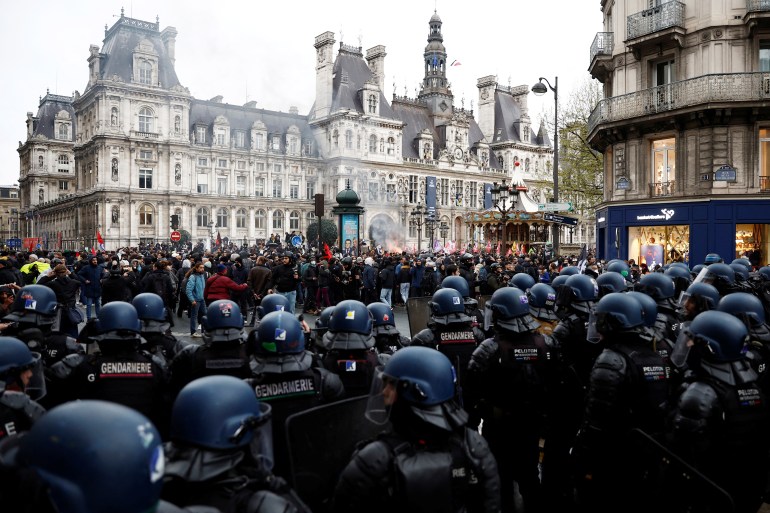Macron signs France pension reform into law despite protests
The Constitutional Council rules in favour of key provisions of the reform, including raising the retirement age to 64.

French President Emmanuel Macron has signed into law a controversial bill to raise the country’s retirement age by two years.
The proclamation of the law came after France’s Constitutional Council on Friday approved the main retirement-age measure and follows months of protests against the reform, which the government forced through parliament without a final vote.
Keep reading
list of 3 itemsFrance in Protest
France’s Macron heckled by protesters in the Netherlands
The battle to implement the law turned into the biggest domestic challenge of Macron’s second mandate, as he faced widespread popular opposition to the changes but also sliding personal popularity.
The nine-member Constitutional Council ruled in favour of key provisions of the reform, including raising the retirement age to 64 and extending the years of work required for a full pension, saying the legislation was in accordance with French law.

Six minor proposals were rejected, including forcing large companies to publish how many people above 55 they employ, and the creation of a special contract for older workers.
The appearance of the text in France’s Official Journal – the gazette of record – means it has now been enacted into law.
“The Social Security Code is thus amended. In the first paragraph, the word: ‘sixty-two; is replaced by the word: ‘sixty-four’,” states the text, referring to the retirement age.
‘We don’t want it’
Spontaneous demonstrations were held around France before the council’s ruling.
Opponents of the pension reform blockaded entry points into some cities, including Rouen in the west and Marseille in the south, slowing or stopping traffic.
Prime Minister Elisabeth Borne was interrupted while visiting a supermarket outside Paris by a group of people chanting, “We don’t want it”, referring to the way she skirted the vote by lawmakers to advance the pension reform.
The government’s decision to get around a parliamentary vote in March by using special constitutional powers heightened the fury of the measure’s opponents, as well as their determination. Another group awaited Borne in the parking lot.
Union leaders have said the Constitutional Council’s decisions would be respected, but have pledged to continue protests in an attempt to get Macron to withdraw the measure.
The general secretary of the CGT union, Sophie Binet, called for a “popular and historic tidal wave” of people on the streets to oppose the reforms on May 1.
Far-right lawmaker Marine Le Pen denounced the pension reform as “brutal and unjust”. In a statement, she said once the reform is put into practice, it “will mark the definitive rupture between the French people and Emmanuel Macron”.
Polls have consistently shown the majority of French citizens are opposed to working two more years before being able to reap pension benefits.
The legislation also requires people to work 43 years to receive a full pension, among other changes to the system.